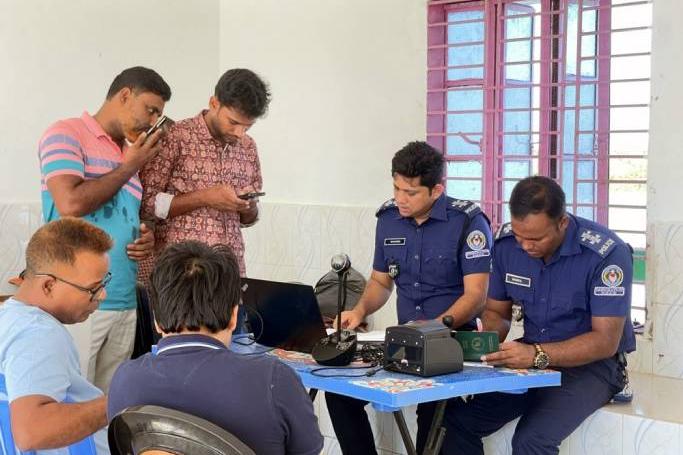The Myanmar junta appeared to be using their usual diplomacy playbook this week as they escorted foreign diplomats to Muslim Rohingya internally displaced people’s camps.
A local media report and social media reaction to the visit indicate a resolution of the Rohingya conundrum may be as difficult to achieve as it has always been.
The heads of several foreign diplomatic missions in Myanmar recently visited Rohingya camps for IDPs in Sittwe and refugee reception centres in Maungdaw. The diplomats arrived in Rakhine State on 1 September and visited some Rohingya villages as well as the Thakkelpyin IDP camp in Sittwe, Development Media Group (DMG) reports.
The Rohingya conundrum can be described as two-fold. Firstly, there is resolution of the Rohingya IDP problem, where Rohingya are living in camps in Rakhine State but eager to return home. Secondly, there are the voiced plans by the Myanmar junta and Bangladesh to start returning Rohingya refugees from the refugee camps in Bangladesh.
As a member of the Thakkelpyin camp management committee told DMG, the diplomats said they would work for the displaced Rohingya to return to their original homes, and gain citizenship. This one camp shelters more than 3,000 Rohingya people who were forced from their homes in Sittwe’s Setyonesu Ward following the intercommunal violence that wracked Rakhine State way back in 2012. The diplomats visited the Taungpyo Letwe and Hla Poe Kaung reception centres in northern Maungdaw on Saturday.
This latest diplomats visit echoes similar moves by the National League for Democracy-led civilian government, escorting foreign delegations to IDP camps, that came to nothing.
To say the situation is complicated would be an understatement. A return of Rohingya IDPs and Rohingya refugees to their land would need the full agreement of the current military junta. But, as commentators note, the Arakan Army (AA) holds significant sway over Rakhine and would need to be involved, and then there are concerns voiced by the Rakhine community. As one social media user posted in response to the DMG story: “No matter who arrives in Rakhine, the repatriation programme will not succeed unless the Arakan community and the AA accept it.”
Myanmar junta media said that during the meeting with foreign diplomats, the secretary of the Arakan State military council, Kyaw Thu Zaw, explained measures taken by the Myanmar side to bring back Rohingya people from Bangladesh in line with a memorandum of understanding signed with Dhaka.
The junta said it has arranged to initially bring back more than 1,000 Hindu and Rohingya people from Bangladesh. But it has yet to announce a specific date for the repatriation. Bangladesh has reportedly said it wishes to start the Rohingya refugee repatriation by the end of this year.
Rohingya persecution has gone on for decades. More than 700,000 Rohingya fled to Bangladesh when the Myanmar military carried out brutal so-called “area clearance operations” in the aftermath of Arakan Rohingya Salvation Army (ARSA) attacks on multiple border guard police outposts in 2017. Analysts question whether the ARSA attacks were used by the Myanmar military as an excuse to clear Rohingya from Rakhine State and lay claim to the land, voicing skepticism that the current junta will promote a meaningful return of the refugees.
Meanwhile, Bangladeshi officials have sent a list of over 3,000 Rohingya to Myanmar authorities for a pilot programme of verification, with expectation to begin repatriation of Rohingya to Myanmar this year, according to a report by Anadolu news agency. A high-level delegation from Bangladesh visited Myanmar on 4 September to lead a Chinese-mediated meeting on possible repatriation of Rohingya people to Myanmar under the mediation of China.
Concerns about the conditions of return have been voiced by some Rohingya refugees in the camps in Bangladesh. According to reports, some have argued that they should be allowed to return to their home areas, not a newly-built settlement, and that Myanmar citizenship should be part of the process.
Resettlement of both Rohingya IDPs and refugees, even if the process were to go ahead, appears to focus on the setting up by the Myanmar authorities of new settlements with the possibility that the returnees’ personal status would not include citizenship, and would therefore mean curbs on movement and travel. The 1982 Burma Citizenship Act prevents Rohingya from accepting citizenship.
At this stage, it is unclear how the Myanmar junta will proceed, despite the openness displayed during the foreign diplomats’ visit. Infrastructure developers such as China and India would benefit if peace were brought to Rakhine State and inter-communal tensions were lowered, hence a purported willingness to help mediate for a resolution of the Rohingya conundrum.












